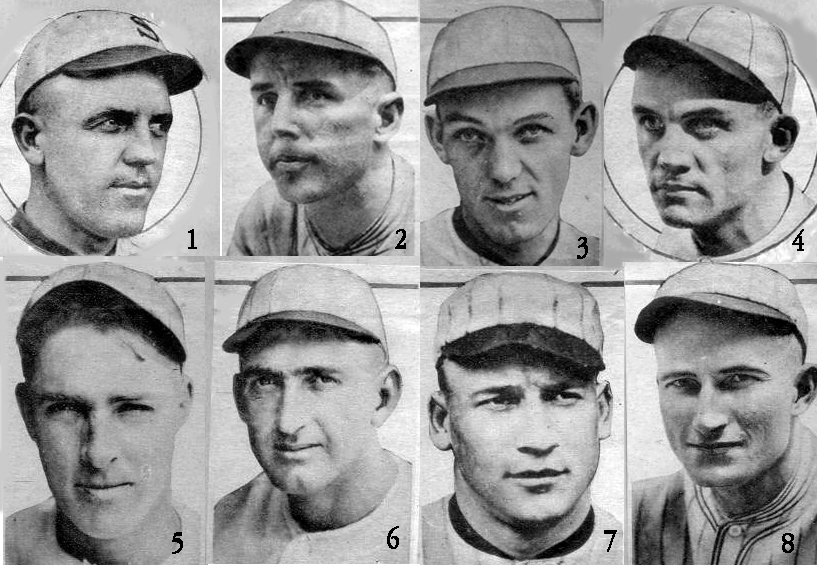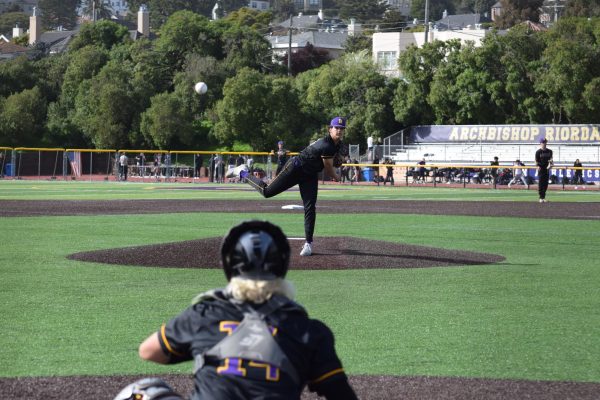Black Sox ordeal remembered as centennial approaches
Eight members of the Chicago White Sox were accused of accepting money to throw the 1919 World Series. Risberg is 5, Jackson is 6
March 30, 2019
In 1989, Cincinnati Reds manager Pete Rose was banned from baseball after rumors swirled that he bet on games while playing and managing.
Rose, baseball’s all-time hits leader (4,256), hasn’t been reinstated. 2019 marks the 30th anniversary of the ban, but it’s not the first or most popular expulsion in the history of baseball.
Way back in 1919, the Cincinnati Reds went up against the Chicago White Sox in the World Series. The Sox were led by star outfielder Shoeless Joe Jackson, who hit .351 in the regular season. Owner Charles Comiskey was a freak when it came to media and attention; building the powerhouse team made him even more frisky.
Comiskey was blind to any obstacle. Ultimately, when the players complained about the salary, he didn’t budge and turned a blind eye. This led the players to take charge. The ringleader was first baseman Chick Gandil, who pulled seven other players aside in an attempt to throw the series to the Reds for money.
A notable in that group was Shoeless Joe Jackson, who was one of baseball’s premier talents. At 31, the outfielder from South Carolina was on his way to greatness. Just 17 years later, the National Baseball Hall of Fame was formed in Cooperstown, NY.
The Sox lost the series in eight games and an investigation began the following year when one of the players confessed. A grand jury was brought in and Judge Kenesaw Mountain Landis was elected commissioner of baseball; he subsequently banned eight players in relation to the fix.
Jackson was one and many question that decision, as he hit a whopping .375 during the World Series. He was also illiterate.
Instead of hitting the books, he often helped his father with sharecropping activities around the family’s home. It’s fair to question his involvement and how much he really knew.
Eric Risberg was told by his great-uncle Clem (Risberg), Swede Risberg’s cousin, about “an infamous relative who played baseball. It wasn’t until 1982 when I moved to San Francisco that a Sports Illustrated writer asked me if I was related to Swede (who was from San Francisco) and told me more about him. Later, when the movie ‘Eight Men Out’ was released, I learned more about him, and I even visited the old Comiskey Park in Chicago where he played. I am a baseball photographer, so the link to him was an interesting coincidence.”
In F. Scott Fitzgerald’s The Great Gatsby, Gatsby tells Nick Carraway that (fictional character) Meyer Wolsheim was the orchestrator of the scandal. The movie “Field of Dreams” also tackles the topic.
Risberg said, “I think it’s unfortunate. The Black Sox obviously were the better team, but these guys got paid hardly anything, and some of them were great players, like Jackson.”
Now, fantasy sports and Las Vegas involvement with betting is acceptable. However, the rules of betting as a player or member of the organization could still get an individual banned from the sport.
As the 100 year anniversary of the scandal approaches, the difference between today and then couldn’t be more distinct. First, players don’t need the money as much as they did back then. Also, players are also more hungry to win championships.
Risberg said, “It’s amazing that the MLB allows online gambling, where for years they wouldn’t have anything to do with it.”
He added, “It’s coming full circle. The steroid scandal of its day was probably similar to the Black Sox scandal of its day, but who knows — the gambling may have been a bigger issue back then.”













